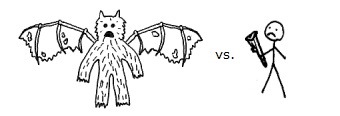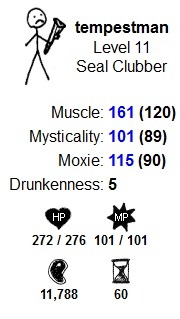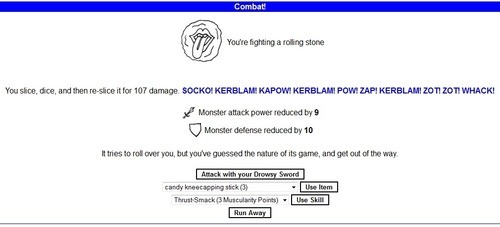Kingdom of Loathing is a turn-based role-playing game created by Asymmetric Publications.
The premise of the game is simple enough: you're an adventurer
traveling through the magical Kingdom of Loathing in search of wealth
(in this case piles of meat), power, and fame. How you accomplish this
goal depends on which class you select upon character creation.
The
six character classes (described on the website as "intoxicating and
intoxicated") are the Turtle Tamer, Seal Clubber, Pastamancer, Sauceror,
Disco Bandit, and Acordian Thief. If you haven't realized this
already, the Kingdom of Loathing does not take itself very seriously.
As
in most RPGs, the Kingdom of Loathing also makes use of an ability
score system. Unlike in most RPGs however, the Kingdom of Loathing's
ability scores are not things like "Strength," "Vitality," and "Wisdom,"
but are instead "Muscle," "Mysticality," and "Moxie." Increasing the
key ability for your class results in gaining levels and unlocking new
powers.
I chose to embark upon my adventure as a Seal Clubber, so
my experiences with this game will be from that perspective. After
tinkering around with the game for a few minutes to familiarize myself
with the controls once more I set out to climb to the Icy Peak of Mt.
McLarge Huge.
 |
| The Dangerous Mt. McLargeHuge, home of eXtreme sports enthusiasts, snowman ninjas, and goats alike. | Image Courtesy of Asymmetric Publications |
After I climbed to the mist-shrouded peaks of Mt. McLargeHuge I had
to fight my way past several frightened yetis that kept knocking me
down. The game assured me that this was quite annoying, and I was
unable to disagree. After getting run over by three yetis, I finally
made it to the very top of the mountain where I met the mighty Groar in
battle.
 |
| The mighty Groar vs. the (hopefully) mightier Tempestman! Surely battle for the bards to sing about! | Images Courtesy of Asymmetric Publications |
We
exchanged blows, I with my mighty Drowsy Sword and he with his claws
and frigid breath attacks. I finally defeated him with my special
maneuver (the Seal Clubber's trademark "Thrust-Smack") and harvested his
skin like any good animal murderer would do. With my foe smote in ruin
before me Balrog-style, I climbed down the mountain to continue my most noble of
quests.
While the description of that battle may have made the
battle seem epic and victory difficult to achieve, I assure you that it
was not. All I really had to do was click on a few buttons and the
screen and before I knew it the mighty Groar was dead before my feet.
Gameplay
The Kingdom of Loathing
uses several different parts to make up its gameplay. Each character
has different abilities, skills, and equipment that determine his or her
strengths and weaknesses. Each day a character can go on 50
Adventures, although there are ways to get more without waiting. Finally
there is the combat system itself.
An Adventure is
best described as a turn or an action. Each day you're given 50
Adventures (signified by the hourglass symbol beneath your character),
which means you can do about 50 different things before you have to wait
until the next day. Some tasks (such as going on vacation) require
more than one Adventure to accomplish. Eating food and drinking alcohol
can replenish a few Adventures each day, but if you drink too much
you'll wind up doing something you'll regret (much like in real life!).
If you don't play the game for a few days you'll find that your
Adventures accumulate each day until you max out at 200 Adventures.
 |
| The ladies love how muscley I am. | Image Courtesy of Asymmetric Publications |
Each
character has three abilities: Muscle (your strengthliness and
fortitude), Mysticality (your mysteriousness and wizardliness), and
Moxie (your chutzpah and roguishness). Muscle is the primary stat for
the Seal Clubber and Turtle Tamer classes and helps determine your total
Hit Points. Mysticality is the primary stat for Pastamancers and
Saucerors and determines how many MP you have to use special skills.
Moxie is the main stat for the Accordion Thief and Disco Bandit classes
and determines your ability to dodge attacks and how much damage you
take from attacks that hit you. You gain levels in the game by
increasing your main stat, which happens over the course of your
adventures and from special items.
Finally there's the ever-important combat. Those of you familiar with the Pokémon
Gameboy and Nintendo DS games released by Nintendo (and I'm hoping that
people reading a blog about video games have at least a passing
knowledge of one of the most successful video game franchises) will find
the combat system to be rather familiar.
Since
the entire game is more-or-less text-based (I hope you like reading),
combat isn't very active. Once you happen across a monster you're given
a few options: "Attack with your [weapon]," "Use Item," and "Use
Skill."
 |
| The pop-culture references never fail to amuse me. | Image Courtesy of Asymmetric Publications |
I've
found that as a Seal Clubber most of my problems can be solved with the
first option. Anything that can't be killed with a regular attack from
my sword can usually be taken care of with a Thrust-Smack. Other
classes have their own ways of solving disputes, such as the Turtle
Tamer's shell auras and the Accordion Thief's songs.
Once you've
chosen which method of attack you wish to use, the game will determine
how effective it was and then have the monster attack you in return.
This back-and-forth will continue until you're victorious or sent home
to lick your wounds. Should you survive (and the survival rate of most
adventurers is actually pretty high), you'll be given your precious
loot, which is usually in the form of meat (the game's currency), one or
two minor items, and occasionally an important or powerful quest item
or weapon.
The game isn't that hard to figure out, although the
sheer amount of things you can do and loot you can acquire can be
overwhelming at first. However, once you get used to it, Kingdom of
Loathing becomes a great game that can be played for a few minutes in
your spare time. Just don't play it during class or at an important
meeting.
Best Pop Culture Reference
The Kingdom of
Loathing is chock-full of pop culture references, which really help set
the unapologetically sarcastic tone of the game. So far one of my
favorite references in the game is the Meatloaf Helmet, a piece of armor
that can be worn to increase your resistance against stench damage (I
did mention that this game doesn't take itself too seriously, right?)
Meatloaf Helmet- This is a helmet made of meatloaf. Mmmmm. You feel like a Bat out of Hell when you wear it. You would do anything for this hat (but you won't do that.)

Thanks for your share! game đăt bom truyện ngôn tình h nặng sm download beetalk baby smiling quotes checkers game unblocked
ReplyDelete